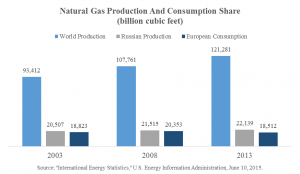Political Versus Market Energy Economics
With news of a consensus on its financing structure, details of a proposed natural gas pipeline called the Turkish Stream are expected to be finalized as early as June 18th. The pipeline, which is estimated by internal sources to cost over $2 billion, will originate in Russia, pass through Turkey and end in Greece. The move seems very strategic of Russia — one of the largest exporters of gas in the world — which has shown interest in the financial backing of Greece’s new leadership under leftist hardliners. Ironically, amidst a very public distaste regarding the European Union’s stance on repayment of Greek debts, the ailing state has expedited approval of the project, which would bottleneck Russian gas through the country, forcing many European countries to pay them transit fees.
The U.S. Department of State (DOS) warned that expanding Europe’s dependence on Russian gas would only increase political instability in the region and could reduce price competitiveness of natural gas in Europe, however members of Greece’s ruling party, Syriza, quickly rebuked the observations and labeled them as attempted blackmail. The DOS also claimed that Russia did not build the pipeline out of benevolence or even a desire for financial gain, but purely to snub the Trans-Adriatic Pipeline, an alternative Western-backed project which was also forecasted to bring needed gas resources from Azerbaijan to Europe through Greece. Members of the DOS even went so far as to say that Turkish Stream in itself is not an economic investment, and there are perhaps a few reasons to believe so:
- The offshore portion of Turkish Stream completely circumvents other European countries in almost a comical fashion given the alternative price of simply building land-based pipelines through Ukraine… this costly act of political angst immediately made the marine portion of the pipeline $600 million more expensive;
- According to the Energy Information Administration (EIA) Russian gas has been losing market share with almost every passing year for over ten years, while European demand for gas has fallen and stagnated, no doubt due to Europe’s lethargic growth numbers:
- Perhaps in an effort to shift infrastructure costs onto the European Union (EU), Russia has announced a “build it yourself” policy for all potential client nations hoping to have pipelines connecting them to Greece… while such a proclamation may seem efficient for them and strategically savvy, consider that many European countries such as Sweden now acquire less than 48 percent of their energy consumption needs from fossil fuels. In the meantime, Italy, Romania, Germany, Estonia and Bulgaria among many others are in the process of phasing out much of their gas use, and are actually years ahead of their target schedules for implementation of nuclear and renewable energies.
At the aggregate level, natural gas is an extremely profitable energy resource which is seeing double-digit growth across many different countries, mainly in the developing world. However, mature economies such as those in Europe have not characterized themselves as extremely profitable or high-growth markets, meaning that they are among the least likely areas to see attractive returns on expensive fossil energy infrastructure projects like Turkish Stream.

Isn’t there already a gas pipeline from Russia directly to Germany?
Also, instead of attributing the lack of growth in gas demand to simply a stagnating economy, you could have mentioned that many European countries are trying to ween themselves off Russian oil and gas due to geopolitical considerations.